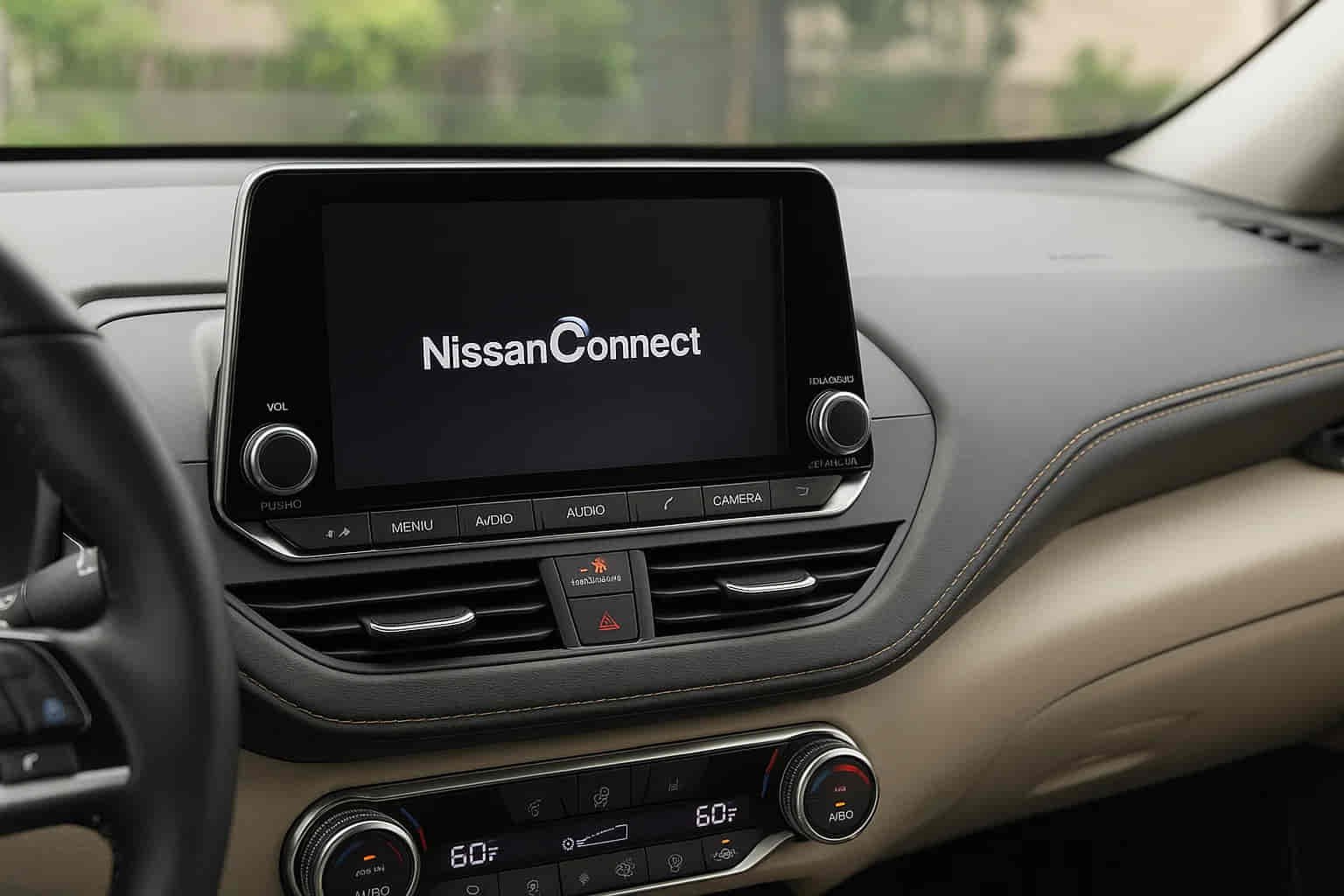When shopping for a new car in 2026, technology is no longer just a bonus — it is one of the biggest deciding factors for buyers. Nissan has been pushing hard with its in-car infotainment system, NissanConnect, promoting it as a smarter way to stay connected, safer on the road, and more in control of your vehicle. But here’s the real question: Is Nissan Connect worth it in 2026, or is it just another monthly expense you can skip?
Many drivers love the convenience of features like remote start, live traffic navigation, and emergency response services. Others, however, feel frustrated paying for a subscription when Apple CarPlay and Android Auto already cover the basics for free. This has turned NissanConnect into one of the most debated add-ons in the auto industry, especially among families who value safety but also want to avoid unnecessary costs.
In this honest review, we’ll take a close look at what NissanConnect really offers in 2026, how it compares with rival systems, and whether the benefits outweigh the drawbacks. By the end, you’ll know exactly if Nissan Connect is worth it for your lifestyle — or if you should save your money for something else.
What Is NissanConnect in 2026?
NissanConnect is Nissan’s in-car infotainment and connectivity system, designed to bring together navigation, entertainment, safety, and remote access into one platform. In 2026, the system has evolved far beyond a simple dashboard screen. It now integrates with smartphones, smart home devices, and even electric vehicle apps, giving drivers more control both inside and outside the car.
At its core, NissanConnect combines real-time navigation, traffic updates, and weather alerts with streaming music, hands-free calling, and voice-controlled assistants. Beyond convenience, it also includes security-focused features such as automatic crash response, roadside assistance, and vehicle health monitoring. For families, the ability to lock or unlock doors remotely or check where a car is parked adds peace of mind in daily life.
One of the biggest updates for 2026 is the improved over-the-air software upgrade system. Instead of waiting for a dealership visit, drivers now receive feature updates and security patches automatically, keeping their system fresh without extra effort. Another upgrade is deeper integration with electric Nissan models, including battery monitoring and smart charging schedules, which is a key selling point for EV owners.
So, is Nissan Connect worth it in 2026? At least on paper, it looks promising. It positions itself not just as a driving assistant, but as an extension of your digital lifestyle, aiming to make driving smoother, safer, and more personalized. The real test, however, comes when you compare these features with what free alternatives already provide.
Key Features That Make NissanConnect Attractive
The appeal of NissanConnect in 202 comes down to the combination of convenience and safety that goes beyond what most free systems can offer. While Apple CarPlay and Android Auto are great for music and maps, NissanConnect is designed to integrate more deeply with the car itself, giving drivers features that feel like an extension of ownership.
One of the standout features is remote access. Through the NissanConnect app, drivers can start the engine, lock or unlock doors, and even locate their vehicle in a crowded parking lot. For parents, being able to check where a teen driver is at any time adds an extra layer of reassurance.
Navigation is another highlight. NissanConnect uses real-time traffic and weather data, providing alternative routes before you get stuck. This makes it especially useful for commuters or families planning long road trips. Combined with live traffic rerouting, it helps save time and fuel.
Safety also plays a big role. Automatic crash response and roadside assistance mean that help is available when it matters most. Vehicle health reports notify drivers about maintenance needs before small issues become big repairs. These features may not sound glamorous, but they deliver real value in everyday driving.
Finally, NissanConnect now integrates with voice assistants like Amazon Alexa and Google Assistant, making it easy to send destinations to your car, check vehicle status from home, or even control smart home devices from the driver’s seat.
Altogether, these features make NissanConnect more than just another infotainment screen. They turn it into a connected ecosystem, tailored for drivers who value convenience, safety, and seamless technology.
Downsides & Limitations of NissanConnect
While NissanConnect offers many useful tools, it is not without flaws. One of the biggest criticisms in 2026 is the subscription cost. Many drivers feel frustrated paying extra every month or year for features that, in some cases, overlap with free services already built into their smartphones. Depending on the package, costs can add up quickly, especially if you plan to keep the car long term.
Another limitation is the overlap with Apple CarPlay and Android Auto. These platforms already handle navigation, streaming, and voice commands effectively, and they come at no additional cost. For drivers who mainly use their phones for music and maps, NissanConnect may feel redundant.
Performance can also be inconsistent. Owners have reported occasional lag, dropped connections, or software glitches. Although over-the-air updates help address issues faster than before, the user experience is not always as seamless as promised. This is particularly noticeable when compared to the fluid interfaces of modern smartphones.
Availability is another challenge. Not every Nissan model comes with the full NissanConnect suite. Some trims only include limited features, requiring an upgrade to higher packages to unlock the full experience. For budget-conscious buyers, this can feel like a forced upsell.
Lastly, while NissanConnect is improving, it still lacks some of the polish and ecosystem depth seen in rival brands like Tesla or even Hyundai’s Bluelink. This raises the question: if you are going to pay for a subscription, are you getting the best value compared to what competitors offer?
These downsides do not make NissanConnect a bad system, but they highlight why potential buyers should carefully weigh the pros and cons before committing to the subscription.
NissanConnect vs Apple CarPlay & Android Auto
When asking is Nissan Connect worth it in 2026, the comparison with Apple CarPlay and Android Auto is unavoidable. These two systems are now standard in most new cars and, unlike NissanConnect, they come free of charge. They deliver smooth navigation, music streaming, messaging, and voice commands directly from your smartphone, making them highly reliable and familiar for most drivers.
Where NissanConnect stands out is in vehicle-specific integration. While CarPlay and Android Auto are limited to entertainment and communication, NissanConnect reaches deeper into the car. Remote start, door lock control, crash response, and vehicle health monitoring are functions that smartphone mirroring simply cannot provide. For families or safety-focused buyers, this added layer of connectivity can be worth the subscription fee.
However, in terms of user interface and speed, Apple and Google still hold the advantage. Their ecosystems update constantly, ensuring smoother performance and more apps. NissanConnect has improved with over-the-air updates, but it still lags behind in terms of design fluidity and responsiveness.
Cost is another factor. With CarPlay and Android Auto available at no extra fee, many drivers hesitate to justify paying for NissanConnect. For tech-savvy users who already rely on Google Maps, Waze, or Spotify, the overlap feels unnecessary.
Ultimately, the choice depends on what you value most. If you want deep integration with your vehicle and extra safety services, NissanConnect offers something beyond CarPlay and Android Auto. But if your primary needs are navigation and entertainment, the free alternatives may already be more than enough.
Real Owner Reviews – What Nissan Drivers Say in 2026
To truly answer the question is Nissan Connect worth it in 2026, it helps to listen to actual Nissan owners. Reviews from forums, Reddit threads, and automotive communities show a clear divide in opinion.
On the positive side, many drivers highlight the peace of mind NissanConnect brings. Parents appreciate the ability to track teen drivers or get instant notifications if the car leaves a designated area. Road trip enthusiasts value live traffic updates and emergency assistance, which they say have saved them hours of frustration or even helped in dangerous situations. For EV owners, the integration with charging status and range monitoring has been described as a “must-have feature.”
But not everyone is impressed. A large group of owners feel the subscription fee isn’t justified, especially when CarPlay or Android Auto already covers most of their daily needs for free. Some also complain about glitches, such as delayed app responses or difficulty connecting in areas with weak signal. One recurring sentiment is that NissanConnect feels like paying extra for features that should already be standard.
Interestingly, long-term Nissan owners note that while the service has improved since earlier versions, it still lacks the polish of competitors like Tesla’s connected services. For them, the question isn’t whether NissanConnect works, but whether it works well enough to warrant the price tag.
In short, owner feedback paints a balanced picture: NissanConnect shines in safety and convenience, but struggles with cost justification and user experience consistency.
Is NissanConnect Worth It for You?
At the end of the day, deciding if Nissan Connect is worth it in 2026 comes down to your lifestyle, driving habits, and priorities. For some drivers, it delivers undeniable value. For others, it feels like an unnecessary cost layered on top of already expensive car ownership.
If you are a family-focused driver, NissanConnect makes sense. The ability to track your vehicle, set speed alerts for teen drivers, and access emergency assistance instantly can provide peace of mind that free alternatives simply cannot match. Frequent travelers and commuters also find value in live traffic rerouting and roadside support, which can make long drives less stressful.
For electric vehicle owners, NissanConnect has become almost essential. Features like charging status updates, range tracking, and smart charging schedules integrate seamlessly with Nissan’s EV lineup, making ownership easier and more efficient.
On the flip side, if your main needs are navigation, music, and hands-free calls, Apple CarPlay and Android Auto may already cover everything you want — without an additional bill. Tech-savvy drivers who rely heavily on smartphone apps often consider NissanConnect redundant, especially when performance hiccups arise.
The bottom line: NissanConnect is not a one-size-fits-all solution. It is a strong option if you value deeper integration with your car and extra safety features, but if cost efficiency is your top priority, you may be better off sticking with the free systems already built into your phone.
Conclusion
So, is Nissan Connect worth it in 2026? The answer depends on how much you value safety, convenience, and seamless integration with your vehicle. NissanConnect clearly offers more than just entertainment. With features like remote start, emergency response, and EV charging management, it gives drivers a sense of control that free smartphone systems simply cannot match. For families, long-distance commuters, and electric car owners, these benefits can be genuinely worthwhile.
That said, the subscription cost remains a sticking point. Many drivers find it hard to justify paying for something that overlaps with Apple CarPlay and Android Auto, which already deliver smooth navigation, music, and voice control for free. Add in occasional glitches and limited availability across trims, and it’s easy to see why some owners skip the service altogether.
In the end, NissanConnect is best viewed as an upgrade, not a necessity. If you are the type of driver who prioritizes safety and wants a connected experience that extends beyond your smartphone, it may very well be worth the price. But if your focus is on affordability and simplicity, you might prefer to rely on the free tools you already use every day.
So, what about you — would you pay extra for NissanConnect, or stick with CarPlay and Android Auto?

